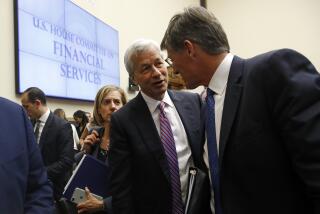Governor to Bush: Keep Tax Pledge, Ask Europe to Pay More for Defense
- Share via
DAVOS, Switzerland — Gov. George Deukmejian declared Sunday that President Bush should live up to his campaign promise and resist pressure to raise taxes, asserting a tax increase could “trigger a worldwide recession.”
The governor also gently lectured his largely European audience at an international economic conference here that, if Europe were to shoulder more of the burden of its own defense, the United States could cut military spending and reduce its budget deficit.
Deukmejian further suggested that the Bush Administration and Congress restore tax-deductible individual retirement accounts (IRAs) for all taxpayers, a casualty of the 1986 tax reform. This would stimulate savings, generating capital for investment and reducing the flow of U.S. consumer dollars overseas, he said.
The Republican governor’s adamant anti-tax posture was not shared by two fellow members of his panel: U.S. Sen. Bill Bradley (D-N.J.), a member of the Senate Finance Committee, and John A. Young, president and chief executive officer of Hewlett-Packard Co.
“Personally, what do I think we should do?” Bradley asked rhetorically. “I think we should cut spending. I think we should pass a gasoline tax and have an increase in cigarette taxes, in the neighborhood of $25 (billion) to $30 billion.
“I, however, would not advocate that in the United States publicly, because I am a Democrat.”
Recalling that Democratic presidential nominee Walter F. Mondale was hurt politically in 1984 by promising voters a tax increase, and that Bush was helped in 1988 by vowing not to raise taxes, Bradley--himself considered to be a potential White House aspirant--said: “I, therefore, as a Democrat do not want to play ‘Fool’ in George Bush’s drama.”
Concern Over Trade
Martin Feldstein, who was Ronald Reagan’s chief economic adviser in his first presidential term, advocated a further weakening of the dollar by 10% to 15% in order to make U.S. exports less expensive abroad and more attractive to foreign consumers. He insisted that this is the only way to substantially reduce the nagging U.S. trade deficit, estimated to have been $136 billion last year.
The four-member panel expounded on “the U.S. world role after the elections” before several hundred attendees to the annual conference of the World Economic Forum. People shell out registration fees of $4,000 to $8,000 to attend this weeklong conference at a ski resort in the Swiss Alps.
Deukmejian, here for three days, freely acknowledged that he is “not an expert in international economics.” He said he came as governor of a state with the sixth-largest economy in the world--and as a campaigner for Bush who “saw firsthand which issues made a difference with the voters and which did not.”
“Make no mistake, there was indeed a mandate in the vote for President,” the governor asserted. “(Americans) voted for the candidate who told them without hesitation that taxes should not be increased.”
Bush’s chief of staff, John H. Sununu, recently suggested that the no-tax pledge might have to bend if an adverse economic “climate” were created by failure to significantly reduce the nation’s $155-billion budget deficit.
But Deukmejian urged Bush indirectly to stick by his guns.
“I know the conventional wisdom says that a tax increase is the answer,” Deukmejian commented, adding: “The deficit can and must be reduced by controlling spending. We cannot risk triggering a worldwide recession through a major tax increase.”
And bringing up a sensitive subject, Deukmejian said: “Many have suggested that we further limit defense spending. That can be done if our allies, who want us to reduce the deficit, agree to a greater sharing of the burden of maintaining our defenses around the world.”
Roughly half the U.S. military budget currently is devoted to the defense of Europe. And many in Washington--Democrats and Republicans--have been demanding increased “burden-sharing” by the other North Atlantic Treaty Organization countries.
Deukmejian also said the U.S. government “should work toward a tax system that penalizes debt and encourages savings--and not the other way around.”
Asked later to elaborate in an audience question-and-answer session, Deukmejian said that abolishing tax credits for IRAs “was a very unwise move.” And he said they should be reinstated.
Deukmejian also denounced as “very, very poor policy” the controversial idea recently floated by Treasury Secretary Nicholas F. Brady of taxing savings and checking accounts to help finance bailouts in the savings and loan industry.
“That would be completely contrary to encouraging savings,” Deukmejian said. “I hope it does not receive any kind of support in Washington.”
More to Read
Get the L.A. Times Politics newsletter
Deeply reported insights into legislation, politics and policy from Sacramento, Washington and beyond. In your inbox twice per week.
You may occasionally receive promotional content from the Los Angeles Times.










